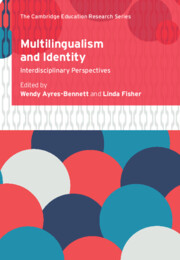Book contents
- Multilingualism and Identity
- Multilingualism and Identity
- Copyright page
- Contents
- Figures
- Tables
- Contributors
- 1 Towards Interdisciplinarity in Multilingual Identity Research
- Part I Situated Multilingualism and Identity
- Part II Multilingual Identity Practices
- 8 Decolonizing Languages in Rural Settings
- 9 Seeking Methodological Rigour in Language and Identity Research
- 10 Translation, Identity and Translanguaging
- 11 The Complexity of Identities
- 12 Narrating Heterogeneous Identities in Multilingual Communities
- Part III Multilingual Identity and Investment
- References
- Index
11 - The Complexity of Identities
Insights from EMI Educators’ Multilingual Identities
from Part II - Multilingual Identity Practices
Published online by Cambridge University Press: 22 July 2022
- Multilingualism and Identity
- Multilingualism and Identity
- Copyright page
- Contents
- Figures
- Tables
- Contributors
- 1 Towards Interdisciplinarity in Multilingual Identity Research
- Part I Situated Multilingualism and Identity
- Part II Multilingual Identity Practices
- 8 Decolonizing Languages in Rural Settings
- 9 Seeking Methodological Rigour in Language and Identity Research
- 10 Translation, Identity and Translanguaging
- 11 The Complexity of Identities
- 12 Narrating Heterogeneous Identities in Multilingual Communities
- Part III Multilingual Identity and Investment
- References
- Index
Summary
In this chapter, we explore the potential of conceptualizing identity as a complex dynamic system. The chapter begins with a critical reflection on how problematic dichotomies in discussions of self and identity have created unhelpful barriers between different areas of self-related work. Exploring integrative approaches to conceptualizing self, we suggest ways in which identity can be viewed as a complex dynamic system. In particular, we focus on the characteristic of emergence and how this can accommodate the notion of a continuously dynamic, adaptive and emergent sense of self. Additionally, we argue for a greater integration of both the psychological and the social in discussions of identity. We draw parallels to developments in multilingualism and notions of translanguaging which also point to the merits of a complexity perspective. Considering the implications for research, we stress the need to capture complexity which involves the psychological and social as well as dynamics across different timescales. We illustrate our line of thinking with data extracts from a study with English-Medium Instruction (EMI) teachers working in Austria.
Information
- Type
- Chapter
- Information
- Multilingualism and IdentityInterdisciplinary Perspectives, pp. 221 - 238Publisher: Cambridge University PressPrint publication year: 2022
Accessibility standard: Unknown
Why this information is here
This section outlines the accessibility features of this content - including support for screen readers, full keyboard navigation and high-contrast display options. This may not be relevant for you.Accessibility Information
- 2
- Cited by
